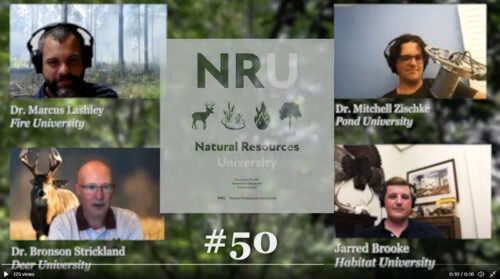 Purdue University - Extension - Forestry and Natural Resources
Purdue University - Extension - Forestry and Natural Resources
Got Nature? Blog
Wild Bulletin, Indiana Department of Natural Resources (DNR) Fish and Wildlife: Our latest Fishing Guide features women anglers, responsible fishing practices, a delicious French-style walleye recipe, and the regulations you need for having a successful day fishing in Indiana’s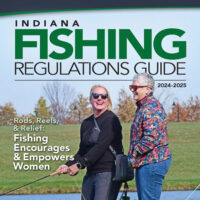 waters.
waters.
You can find the free guide online or pick up a hard copy at your local license retailer.
This guide provides a summary of Indiana fishing regulations. These regulations apply only to fish that originate from or are taken from Indiana’s public waters. Fish from public waters that migrate into or from private waters are still covered by these regulations. These regulations do not apply to fish in private waters that did not originate from public waters.
This guide is not intended to be a complete digest of regulations. If you need complete versions of Indiana rules and regulations for fishing, they can be found in Indiana Code or in Indiana Administrative Code Title 312.
To view this new guide, please visit Indiana Department of Natural Resources: Fishing Guide & Regulations.
Resources:
Hybrid Striped Bass Farmed Fish Fact Sheet, The Education Store
Largemouth Bass Farmed Fish Fact Sheet, The Education Store
Seafood Basics: A Toolkit for Understanding Seafood, Nutrition, Safety and Preparation, and Sourcing, The Education Store
Walleye Farmed Fish Fact Sheet, The Education Store
Rainbow Trout Farmed Fish Fact Sheet, The Education Store
A Guide to Small-Scale Fish Processing Using Local Kitchen Facilities, The Education Store
Aquaculture Family Coloring Book Development, The Education Store
Eat Midwest Fish, Illinois-Indiana Sea Grant online resource hub
Subscribe to Purdue Extension-Forestry & Natural Resources YouTube Channel, Wildlife Playlist
Indiana Department of Natural Resources
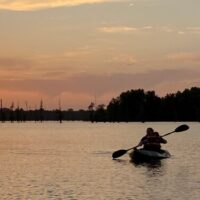 MyDNR, Indiana’s Outdoor Newsletter: Become a Paddlecraft Wildlife Index volunteer and help DNR by documenting the wildlife you observe while on the water from June 1 to July 31. After signing up online, you will be mailed a packet with details on how to participate.
MyDNR, Indiana’s Outdoor Newsletter: Become a Paddlecraft Wildlife Index volunteer and help DNR by documenting the wildlife you observe while on the water from June 1 to July 31. After signing up online, you will be mailed a packet with details on how to participate.
Paddling is a great way to enjoy Indiana’s natural beauty, observe wildlife, and connect with nature. Indiana paddlers have a unique opportunity to observe wildlife while enjoying Indiana’s countless water resources. Indiana DNR would like more information about the wildlife that spend time around Indiana’s waterways. The Indiana Paddlecraft Wildlife Index compiles wildlife observations from people who use canoes, kayaks, or other non-motorized paddlecraft on Indiana’s waterways. Volunteer paddlers can help by completing a paddling trip postcard documenting the wildlife they observed while floating from June 1 to July 31.
Newsletter can be found online May: DNR: Communications: MyDNR Email Newsletter (in.gov)
For more information please visit Paddlecraft Wildlife Index – MyDNR.
Resources:
Yellow Perch Farmed Fish Fact Sheet, The Education Store, Purdue Extension’s resource center
Rainbow Trout Farmed Fish Fact Sheet, The Education Store
American Paddlefish, The Education Store
Aquaculture Family Coloring Book Development, The Education Store
Eat Midwest Fish, Illinois-Indiana Sea Grant online resource hub
Protect Your Waters, U.S. Fish and Wildlife Service & U.S. Coast Guard
What are invasive species and why should I care?, Got Nature? Blog, Purdue Extension – Forestry and Natural Resources
Aquatic Invasive Species in the Great Lakes: The Quagga Mussel, Purdue Extension – Forestry & Natural Resources (FNR) Got Nature? Blog
Aquatic Invaders in the Marketplace, Illinois-Indiana Sea Grant (IISG)
Invasive Species, Playlist, Purdue Extension – FNR YouTube Channel
Nongame and Endangered Wildlife, Indiana Department of Natural Resources
Subscribe to Purdue Extension-FNR YouTube Channel
Indiana Department of Natural Resources, Department of Fish & Wildlife
The Natural Resources University podcast group received the gold award in the podcast or radio category from the Association of Natural Resource Extension Professionals (ANREP). The NRU podcast group includes the Habitat University podcast co-hosted by Purdue Extension wildlife specialist Jarred Brooke and Adam Janke, an extension wildlife specialist at Iowa State University.
“Receiving the ANREP Gold Award is an honor,” Brooke said. “What started as casual conversations amongst colleagues about creating science-based natural resources podcasts has blossomed into a podcast network with multiple unique podcasts and over 100 episodes. This collaboration has been a great avenue to get up-to-date science about natural resource management into landowners and managers’ hands (and ears).”
The NRU podcast group initially began with four science-based podcasts covering different aspects of natural resource management: Deer University, Pond University, Fire University and Habitat University.
Deer University, which is hosted by Dr. Bronson Strickland and Steve Demarais, focuses on the science of deer, including deer ecology, biology and management.
Pond University, which was co-hosted by FNR’s Mitch Zischke and Megan Gunn before ending its 11-episode run in August 2021, covered topics from pond habitat to fish stocking, vegetation control and pond construction.
Fire University, which is hosted by Dr. Marcus Lashley, covers the gamut of the latest research in fire ecology and how it relates to management of wildlife and plant communities.
Habitat University, hosted by Brooke and Janke, discusses the science behind wildlife habitat management and how landowners and manages can use different habitat management practices to improve their land for wildlife.
New to the NRU family in 2022-2023 are:
- Wild Turkey Science – Dr. Marcus Lashley and Dr. Will Gulsby bring you the latest research on wild turkey ecology and management
- Timber University – Dr. Brady Self and Dr. Shaun Tanger cover the latest research in timber management.
- Working Wild University – Dr. Alex Few and Dr. Jared Beaver immerse the listener in stories at the heart of the struggle to sustain productive, resilient and connect rural landscapes and communities.
- Fish University – Dr. Wes Neal covers the latest research in fish management from the small pond to the vast ocean.
The series housed within the NRU network aim to deliver expert-based knowledge for their corresponding genre of natural resource management. The network is a partnership between the extension services at several land-grant university, including Mississippi State Extension Service, University of Florida Extension, Iowa State University Extension and Outreach and Purdue Extension. Funding for the project comes from the Renewable Resources Extension Act.
The Natural Resources University podcasts are available through the individual podcast websites, through the NRU podcast main hub or wherever podcasts are available to download.
For full article and more photos view Purdue Forestry and Natural Resources News & Stories: Natural Resources University Podcasts Earn ANREP Gold Award .
More Resources:
Ask an Expert: Pond Management, Purdue Extension-Forestry & Natural Resources (FNR) YouTube playlist
Pond Management: Managing Fish Populations, The Education Store, Purdue Extension’s resource center
Yellow Perch Farmed Fish Fact Sheet, The Education Store
Frogs and Toads of Indiana, The Education Store
Snakes and Lizards of Indiana, The Education Store
Forest Improvement Handbook, The Education Store
Frost Seeding Native Grasses and Forbs with a Drone (UAV), Purdue Extension-FNR
Hardwood Ecosystem Experiment – Wildlife Responses to Timber Harvesting, The Education Store
Invasive Plants: Impact on Environment and People, The Education Store
Sustainable Communities, Purdue Extension
Ask the Expert: Turtles and Snakes video, Got Nature? post
ID That Tree, Purdue Extension-FNR YouTube playlist
Woodland Management Moment , Purdue Extension-FNR YouTube playlist
Wendy Mayer, FNR Communications Coordinator
Purdue University Department of Forestry and Natural Resources
Jarred Brooke, Wildlife Extension Specialist
Purdue Forestry and Natural Resources
In this episode of A Moment in the Wild, extension wildlife specialist Zach Truelock introduces the American toad. He explains where you might find this species, how to identify it and differentiate it from Fowler’s toads and also its mating and metamorphosis process.
If you have any questions regarding wildlife, trees, forest management, wood products, natural resource planning, or other natural resource topics, feel free to contact us by using our Ask an Expert web page.
Resources
A Moment in the Wild, Playlist, Purdue Extension – Forestry and Natural Resources
Sounds of Frogs and Toads of Indiana, Purdue Extension – Forestry and Natural Resources
Ask An Expert: Anurans (Frogs and Toads), Got Nature? Blog, Purdue Extension – Forestry and Natural Resources
Frogs and Toads of Indiana, The Education Store, Purdue Extension resource center
Forestry Management for Reptiles and Amphibians: A Technical Guide for the Midwest, The Education Store
Appreciating Reptiles and Amphibians in Nature, The Education Store
The Nature of Teaching: Adaptations for Aquatic Amphibians, The Education Store, Purdue Extension resource center
Amphibians: Frogs, Toads, and Salamanders, Purdue Nature of Teaching
Nature of Teaching website and YouTube Playlist, Purdue Extension
Help the Hellbender, Playlist & Website
Help the Hellbender, North America’s Giant Salamander, The Education Store
Zach Truelock, Hellbender Technician
Purdue Forestry and Natural Resources
Rod Williams, Assistant Provost for Engagement/Professor of Wildlife Science
Purdue University Department of Forestry and Natural Resources
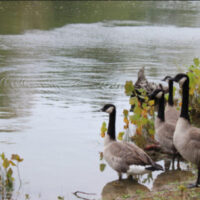 My DNR-Indiana’s Outdoor News: Make preparations now to keep geese off your land. Our friends at Indiana Department of Natural Resources remind us that Canada geese begin scouting for nesting areas in February. If you want to keep geese off your property, now is the time to start preparing. Geese prefer to nest near water surrounded by short, mowed grass and often return to where they have had previous nesting success. Well-kept lawns provide geese with food and a clear line-of-sight to see predators.
My DNR-Indiana’s Outdoor News: Make preparations now to keep geese off your land. Our friends at Indiana Department of Natural Resources remind us that Canada geese begin scouting for nesting areas in February. If you want to keep geese off your property, now is the time to start preparing. Geese prefer to nest near water surrounded by short, mowed grass and often return to where they have had previous nesting success. Well-kept lawns provide geese with food and a clear line-of-sight to see predators.
For more information and resources view the Indiana Department of Natural Resources: Fish and Wildlife – Canada Geese Management web page. You will find regulations, common goose conflicts, Canada Goose Biology, hunting information and more.
Other Resources:
Selecting a Nuisance Wildlife Control Professional, Got Nature? blog, Purdue Extension-Forestry & Natural Resources
Nuisance Canada Goose Management – Indiana Department of Natural Resources (INDNR)
Caution: Feeding Waterfowl May Be Harmful, U.S. fish & Wildlife Service
Indiana Department of Natural Resources
Join fisheries specialist Dr. Mitch Zischke and Fred Whitford from the Purdue Pesticide program as they share about pond vegetation, from what is pond vegetation and why is it useful, to how you prevent negative effects from aquatic plants and what can you do to control problem plants.
If you have any questions regarding trees, forests, wildlife, wood products or other natural resource topics, feel free to contact us by using our Ask an Expert web page.
Resources:
Aquatics & Fisheries, Playlist, Purdue Extension – Forestry and Natural Resources YouTube Channel
Ask an Expert: Pond Wildlife Management, Video, Purdue Extension – FNR YouTube Channel
Ask an Expert: Pond Management: What to Do in Winter, How to Plan for Spring, Video, Purdue Extension – FNR YouTube Channel
Aquatic Pest Management, The Education Store, Purdue Extension resource center
Pond Management: Stocking Fish in Indiana Ponds, The Education Store
Aquatic Plant Management: Identifying and Managing Aquatic Vegetation, The Education Store
Aquatic Vegetation Management, College of Agriculture – Purdue Extension
Pond and Wildlife Management, College of Agriculture – Purdue Extension
Purdue Plant and Pest Diagnostic Lab, College of Agriculture – Purdue Extension
Find your county extension educator, College of Agriculture – Purdue Extension
Purdue Pesticide Program eLearning Aquatic Pest Management Module, Purdue Pesticide Program, Purdue Extension
Part 1: Know Your Pond, Video, Purdue Extension YouTube Channel
Part 2: Selecting the Right Equipment for the Job, Video, Purdue Extension YouTube Channel
Part 3: Proper Placement of the Herbicide, Video, Purdue Extension YouTube Channel
Part 4: Stopping the Hitchhikers Boat Cleaning, Video, Purdue Extension YouTube Channel
Mitch Zischke, Clinical Assistant Professor
Purdue Department of Forestry and Natural Resources
Fred Whitford, Clinical Engagement Professor
Purdue Department of Botany and Plant Pathology
In this episode of A Moment in the Wild, Purdue Extension wildlife specialist Nick Burgmeier introduces you to the eastern newt, a salamander that has a unique relationship with both land and water and also with its fellow salamanders.
If you have any questions regarding wildlife, trees, forest management, wood products, natural resource planning, or other natural resource topics, feel free to contact us by using our Ask an Expert web page.
Resources:
A Moment in the Wild, Playlist, Purdue Extension – Forestry and Natural Resources YouTube Channel
Improving Water Quality by Protecting Sinkholes on Your Property, Video, Purdue Extension – FNR YouTube Channel
Question: Which salamander is this?, Got Nature? Blog, Purdue Extension – Forestry and Natural Resources
Is it a Hellbender or a Mudpuppy?, Got Nature? Blog
Amphibians: Frogs, Toads, and Salamanders, Purdue Nature of Teaching
Help the Hellbender, Playlist & Website
The Nature of Teaching: Adaptations for Aquatic Amphibians, The Education Store, Purdue Extension resource center
Help the Hellbender, North America’s Giant Salamander, The Education Store
Nick Burgmeier, Research Biologist and Wildlife Extension Specialist
Purdue Department of Forestry and Natural Resources
Join Purdue FNR’s own professor of wildlife science, Dr. Rod Williams, along with Mike Lodato, member of the Indiana Technical Advisory Committee for Herpetology, and Nate Engbrecht, herpetologist for the Indiana Department of Natural Resources, to learn tips on the how’s, when’s and where’s of herping in Indiana, including what gear to take, where to go and what you might see in different parts of the state.
If you have any questions regarding wildlife, trees, forest management, wood products, natural resource planning, or other natural resource topics, feel free to contact us by using our Ask an Expert web page.
Resources:
What’s a Herp? Indiana Department of Natural Resources YouTube Channel
Appreciating Reptiles and Amphibians in Nature, The Education Store, Purdue Extension resource center
The Nature of Teaching, Unit 3: Reptiles, Amphibians, and the Scientific Method, The Education Store
A Moment in the Wild: Eastern Newt Video, Purdue Extension – FNR YouTube Channel
Help the Hellbender, Purdue Extension
Rod Williams, Professor of Wildlife Science
Purdue Department of Forestry and Natural Resources
Nate Engbrecht, Herpetologist
Indiana Department of Natural Resources
Mike Lodato, Member of the Indiana Technical Advisory Committee for Herpetology
In this edition of A Moment in the Wild, Purdue Extension wildlife specialist Nick Burgmeier talks about ephemeral wetlands, also known as vernal or seasonal ponds. He discusses the formation of these wetlands, the species who live there, and the importance of keeping these areas for the future.
If you have any questions regarding wildlife, trees, forest management, wood products, natural resource planning or other natural resource topics, feel free to contact us by using our Ask an Expert web page.
Resources
A Moment in the Wild, Playlist, Purdue Extension – Forestry and Natural Resources
Improving Water Quality Around Your Farm, Video, Purdue Extension YouTube channel
Wildlife Habitat Evaluation Program: Preparing for the Wildlife Challenge, The Education Store, Purdue Extension resource center
Pond and Wildlife Management, Purdue College of Agriculture
Help the Hellbender
Nick Burgmeier, Research Biologist and Wildlife Extension Specialist
Purdue Department of Forestry and Natural Resources
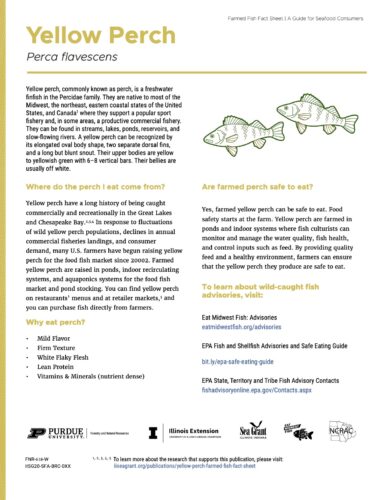 The publication Yellow Perch is the second in a series of fact sheets that describe fish and shellfish produced in the Midwest region of the United States. (See FNR-608-W, Walleye Farmed Fish Fact Sheet.) Yellow perch have been popular among anglers for many years, and since 2002, responding to greater demand, U.S. farmers are raising perch in ponds, aquaponic systems, etc. The fact sheet also includes culinary characteristics, cooking tips, and a recipe for Baked Parmesan Perch.
The publication Yellow Perch is the second in a series of fact sheets that describe fish and shellfish produced in the Midwest region of the United States. (See FNR-608-W, Walleye Farmed Fish Fact Sheet.) Yellow perch have been popular among anglers for many years, and since 2002, responding to greater demand, U.S. farmers are raising perch in ponds, aquaponic systems, etc. The fact sheet also includes culinary characteristics, cooking tips, and a recipe for Baked Parmesan Perch.
View other seafood publications and video resources as you place keywords in the search field located on The Education Store website.
Resources
Fish: Healthy Protein Handout, The Education Store, Purdue Extension resource center
Walleye Farmed Fish Fact Sheet: A Guide for Seafood Consumers, The Education Store
Fish Cleaning with Purdue Extension County Extension Director, Got Nature? Blog, Purdue Extension – Forestry and Natural Resources
Eat Midwest Fish, Website
Sustainable Aquaculture: What does it mean to you?, The Education Store, Purdue Extension resource center
Best Practices Guide for Charter Fishing and COVID-19, The Education Store
Pond Management: Managing Fish Populations, The Education Store
Aquatics & Fisheries, Playlist, Purdue Extension – Forestry and Natural Resources
Amy Shambach, Aquaculture Marketing Outreach Associate
Purdue Department of Forestry and Natural Resources/Illinois Indiana Sea Grant Program
Recent Posts
- 2024-25 Fishing Guide now available – Wild Bulletin
Posted: April 4, 2024 in Alert, Aquaculture/Fish, Aquatic/Aquaculture Resources, How To, Ponds, Wildlife - Paddlecraft Wildlife Index – MyDNR
Posted: May 8, 2023 in Aquatic/Aquaculture Resources, Great Lakes, Ponds, Safety - Natural Resources University Podcasts Earn ANREP Gold Award
Posted: April 14, 2023 in Podcasts, Ponds, Timber Marketing, Wildlife, Woodlands - A Moment in the Wild: American Toad
Posted: May 31, 2022 in Ask the Expert, Ponds - Canada Geese Begin Scouting For Nesting Areas in February
Posted: January 31, 2022 in How To, Ponds, Wildlife - Ask an Expert: Aquatic Plant Management
Posted: July 6, 2021 in Aquaculture/Fish, Aquatic/Aquaculture Resources, Ask the Expert, How To, Plants, Ponds - A Moment in the Wild: Eastern Newt
Posted: July 2, 2021 in Aquaculture/Fish, Ponds - Ask an Expert: Enjoying Indiana Herps
Posted: June 1, 2021 in Aquaculture/Fish, Aquatic/Aquaculture Resources, Ask the Expert, How To, Ponds - A Moment in the Wild: Ephemeral Wetlands
Posted: May 3, 2021 in Ponds, Wildlife - Yellow Perch Becoming Popular
Posted: March 11, 2021 in Aquaculture/Fish, Aquatic/Aquaculture Resources, How To, Ponds, Publication
Archives
Categories
- Alert
- Aquaculture/Fish
- Aquatic/Aquaculture Resources
- Ask the Expert
- Christmas Trees
- Community Development
- Disease
- Drought
- Forestry
- Forests and Street Trees
- Gardening
- Got Nature for Kids
- Great Lakes
- How To
- Invasive Animal Species
- Invasive Insects
- Invasive Plant Species
- Land Use
- Natural Resource Planning
- Nature of Teaching
- Plants
- Podcasts
- Ponds
- Publication
- Safety
- Spiders
- Timber Marketing
- Uncategorized
- Urban Forestry
- Webinar
- Wildlife
- Wood Products/Manufacturing
- Woodland Management Moment
- Woodlands
